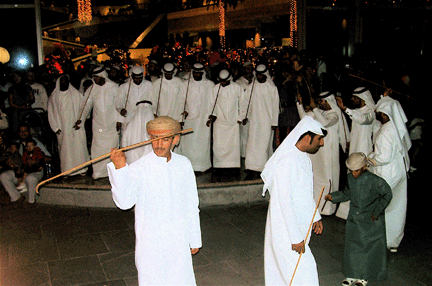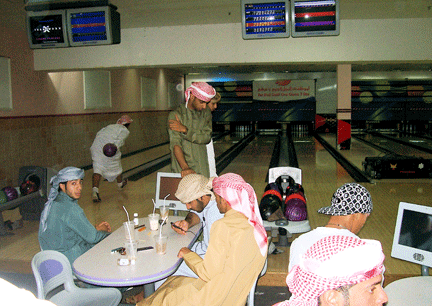
by el-Sayed el-Aswad, United Arab Emirates University
The UAE has developed amenable ways of synchronizing localism with globalism. It is hard to erase specificities that create a misleading portrait of a single global culture. However, Emirati local culture transforms and appropriates aspects of the global into a unique system of local social meaning. The young generations of the Emirates, for instance, have succeeded in assimilating outside influences without deserting their heritage. They have expressed their pride generated by their ability to combine both local culture and modern, global ways of life. They speak Arabic with Emirati dialects, eat indigenous food, use incense and wear traditional costumes (including veils for women) so as to symbolically identify themselves with their traditional society, but, at the same time, they speak English and employ symbols signifying western ‘global’ modernity, such as using computers, eating Western fast food, consuming expensive perfumes, and driving extravagant four wheel-drive cars. However, it can be argued that symbols of modernity do not fundamentally alter people’s beliefs, values, or culture.
In the built environment, one observes that despite the fact that locals live in modern villas with cutting-edge technologies, they are still attached to their customary or traditional ways. For example, in the social and traditional arrangements of domestic activities there are two reception rooms, (maylis or majlis), one for men and another for women, emphasizing gender segregation. This segregation is viewed through both social and religious lenses. In addition, though the locals own very expensive western furniture, and state-of-the-art kitchen appliances and utensils, they prefer to sit on mats or carpets and eat their food with their right hands in a specified manner without the use of spoons or forks.

Furthermore, though some families deal with new global phenomena such as eating out in one of the many chains of fast food restaurants, it does not mean that they follow the same modes of behavior prevalent in Western or American culture. What happens is the emergence of a localized phenomenon where fast food restaurants, for instance, become new centers for social gatherings, relaxation and gossip bearing little, if any, resemblance to the society that created fast food. It is true that young people in Western societies also like to socialize in such restaurants, but the adults do not. Emiratis enjoy this new, modern or ‘global’ experience, while also feeling the pride of their indigenous food.
To take another example, shopping malls have increasingly become the most spectacular arenas of social gathering and human congregation in developing countries influenced by modernization and globalization. In the Emirates, shopping malls are mediums displaying the dynamic interplay between global forces and traditional culture. Generally speaking, in the UAE shopping malls are large, clean, attractive, safe, and air-conditioned places in which activities reach beyond those typically offered in North American shopping malls. Both the Dubai Mall and Al-Ain Mall (named after their respective cities), for example, provide opportunities for people to ice skate, bowl, play computer games and access the Internet via Internet cafes. These malls also provide exercise facilities, and cultural displays and activities that further attract locals, expatriates and tourists. Shopping malls, particularly, are favorite places for young nationals or locals who, encouraged by their affluence, shop for innovative products such as new cell phones and various kinds of electronics in large, flashy stores.
Shopping malls are rapidly developing compared to the typical local market (souk). Local markets, however, challenged by attractive, globalized malls, are motivated to react by providing high quality products not only to maintain themselves but also to compete with the grand shopping and activity centers. The local market competes by providing items that appeal to the indigenous culture –Arab furniture, clothing, certain foods and goods such as dates, coffee, incense, and ladies’ henna, for example – as well as to the working, expatriate cultures – such as those of Arabs, Pakistani, Indian, and others. These small indigenous stores continue to draw the local culture.